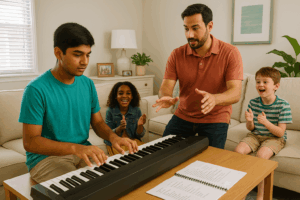When music lessons become routine rather than rewarding, students lose enthusiasm. By choosing to personalize the curriculum for students, in-home instructors ensure each lesson stays engaging, relevant, and motivating from week to week.
Why Personalization Makes a Difference
-
Matches student interests: Learning songs from favorite genres or shows keeps motivation high.
-
Balances structure and choice: Students learn fundamentals while exploring music they care about.
-
Builds ownership: When learners suggest their material, they take more internal responsibility for progress.
In fact, our post on reading chord charts for young musicians shows how tailoring examples to each student improves understanding—particularly when students see how chords apply in their favorite music.
Strategies for a Custom-Tailored Approach
-
Get to know music preferences
-
Ask students what they enjoy: pop songs, Disney tunes, folk, rock, classical.
-
Use their choices to introduce foundational skills like chord progressions and reading.
-
-
Use tiered song arrangements
-
Start with simplified versions, then gradually incorporate more complexity.
-
Layer in theory concepts: chord functions, rhythm notation, expressive markings.
-
-
Offer mini-content projects
-
Compose a short melody together using scale notes.
-
Create a duet version of their chosen song to play with a friend or family member.
-
-
Reflect regularly
-
At the end of each lesson, ask: “What was your favorite part?” or “What would you like to try next?”
-
This flexibility helps lessons feel personalized rather than prescriptive—making students more invested in, and excited about, learning.
Evidence That It Works
Educational research shows that when students see their own interests reflected in lessons, engagement and retention improve significantly. A study emphasized in the Royal Conservatory of Music’s neuroscience report links personalized music instruction with higher motivation and sustained participation. This supports the idea that lessons tailored to students’ preferences aren’t just fun—they’re effective.
FAQ – Tailored Lessons in Practice
Q: Can beginners really learn well through personalized material?
A: Absolutely. Even simple songs can teach fundamentals clearly—if they use the right techniques mixed with structure.
Q: What if a student keeps changing songs week to week?
A: That’s fine as long as foundational skills (like chord transitions or reading basics) stay consistent. Variety enhances progress when balanced with repetition.
Q: How do I suggest appropriate songs without overwhelming?
A: Start with one or two options aligned with skills they’re working on. Then offer new song choices once they show readiness.
